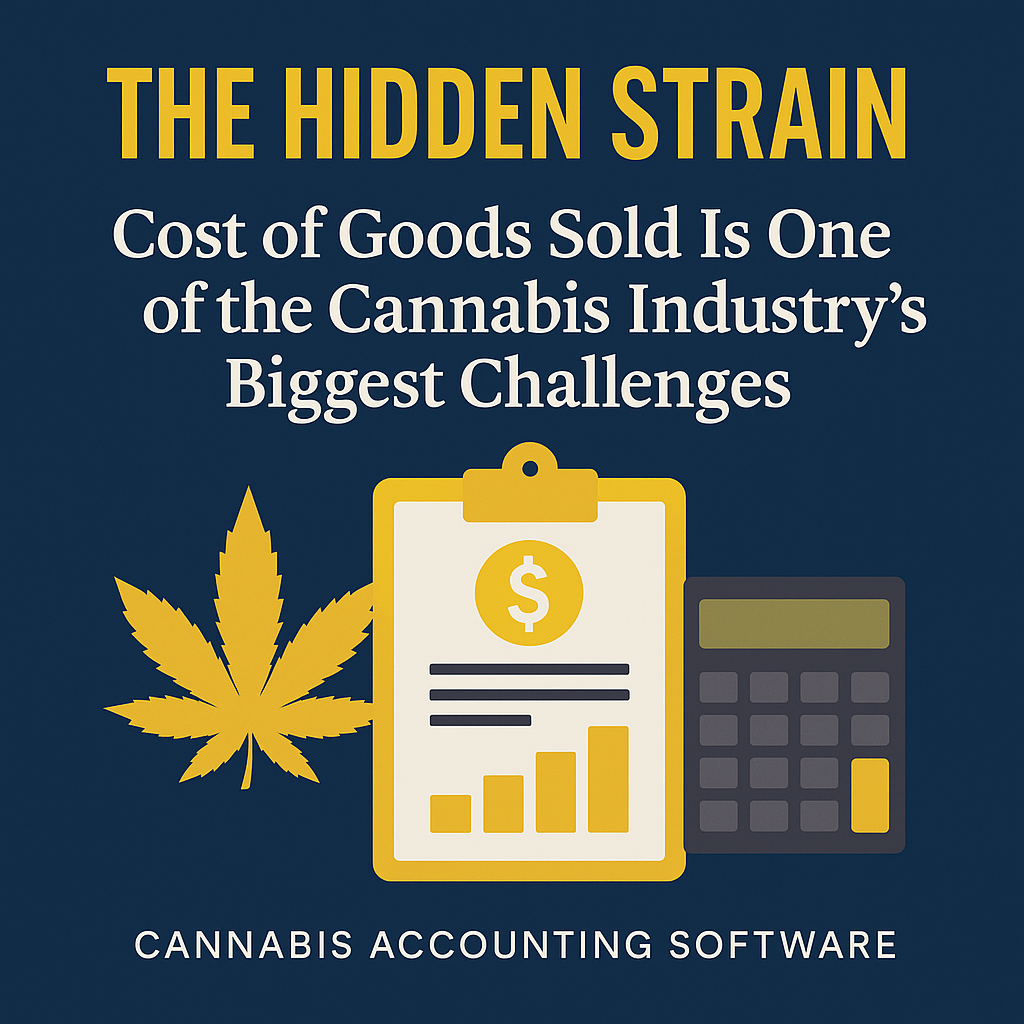The Cannabis Industry’s COGS Conundrum
In the cannabis industry, staying compliant isn’t enough—you have to be profitable, too. And few things impact both more than your ability to track Cost of Goods Sold (COGS) through your cannabis accounting software. For cultivators, manufacturers, and dispensaries alike, properly tracking and calculating COGS is one of the most complicated (and essential) parts of running a cannabis business.
Thanks to IRS Code 280E, cannabis businesses are prohibited from deducting ordinary business expenses like rent, marketing, and payroll—unless those expenses qualify as COGS. That’s why understanding, documenting, and defending your COGS is mission-critical for financial survival.
What Exactly Is COGS in Cannabis?
In general, COGS refers to the direct costs associated with producing or acquiring goods for sale. But in cannabis, the IRS is strict about what can and cannot be included. Examples of allowable COGS include:
-
For Cultivators: Seeds or clones, soil, nutrients, grow lights, labor directly tied to plant care, grow room utilities, and depreciation on grow equipment.
-
For Manufacturers: Raw cannabis material, extraction equipment depreciation, direct labor, and packaging for manufactured goods.
-
For Retailers: The cost of purchasing finished cannabis goods for resale (flower, edibles, vapes, etc.).
What doesn’t count? Marketing, administrative salaries, dispensary rent, and delivery costs—none of these are deductible under 280E unless they’re directly tied to production.
Common COGS Pitfalls in Operations and Cannabis Accounting Software
Unfortunately, many operators are misclassifying or miscalculating COGS without even realizing it. Some of the most common mistakes include:
1. Using the Wrong Chart of Accounts
Generic accounting platforms aren’t built for cannabis, and that means their default Chart of Accounts won’t properly separate 280E-eligible and non-eligible costs. This leads to inaccurate tax reporting and red flags during audits.
2. Poor Cost Segregation
When retail, processing, and cultivation activities share space or staff, you need to allocate costs proportionally. Without proper tracking, businesses either underreport (and overpay) or overreport (and risk penalties).
3. Disconnected Systems
If your inventory, POS, and accounting tools aren’t integrated, your COGS tracking becomes a manual nightmare. Human error and inconsistent data create confusion that’s hard to reconcile—and harder to explain to auditors.
Cannabis Accounting Software: Your Best Defense Against COGS Chaos
Thankfully, cannabis accounting software is evolving to meet the industry’s unique needs. Tools like Quickbooks or Sage Intacct and Adilas offer cannabis operators the ability to automate COGS tracking, improve financial reporting, and reduce tax liabilities—all while staying compliant with 280E.
Let’s break down what each solution brings to the table:
Adilas for Operators Looking for a Cannabis Accounting Software Solution.
Adilas is a powerful cloud-based accounting solution designed for complex, multi-entity businesses. It’s become a top choice for cannabis operators who want:
- All in one seed to sale and accounting Software: This solution works for both accountants and operators. Fully integrated with METRC and state databases while giving the common tools of an accounting platform.
-
Customizable Chart of Accounts: Create a 280E-compliant structure that cleanly separates deductible vs. non-deductible expenses.
-
Robust Financial Reporting: Real-time dashboards and detailed financials for better decision-making.
-
Multi-Entity Management: Manage cultivation, processing, and retail operations under one financial umbrella.
-
E-Commerce: Seamlessly publish your live, real time menu for online orders.
Adilas is especially useful for cannabis companies with multiple licenses or locations and those preparing for outside investment or M&A activity.
Adilas: The Closest Thing to Cannabis ERP
Adilas is widely regarded as the closest the cannabis industry has to a true ERP system. It integrates accounting, inventory management, seed-to-sale tracking, and compliance reporting in one platform.
Here’s what sets Adilas apart:
-
All-in-One Functionality: No need for multiple disconnected platforms—Adilas handles financials, POS, METRC integration, inventory, and more.
-
Real-Time Inventory Valuation: Track raw materials, WIP (work in progress), and finished goods across all departments.
-
Direct COGS Tracking: Attribute costs to batches, strains, SKUs, and departments—ideal for both cultivators and manufacturers.
-
Regulatory Compliance: Stay synced with METRC, BioTrack, or state reporting tools while tracking COGS in parallel.
For vertically integrated cannabis companies, Adilas simplifies everything from seed to sale to spreadsheets.
Why COGS Mastery = Survival in Cannabis
If you’re not actively managing COGS with a system built for cannabis, you’re likely:
-
Overpaying taxes due to missed deductions
-
Risking noncompliance due to inaccurate reporting
-
Missing key data that could help you make better business decisions
Investing in cannabis accounting software like Sage Intacct or Adilas isn’t just about automation—it’s about protecting your business. With razor-thin margins and regulatory minefields, every dollar and every detail matters.
Final Thoughts
The cannabis industry isn’t easy—but with the right systems in place, you can operate smarter, stay compliant, and actually grow your bottom line. Accurate COGS tracking is one of the most valuable financial strategies cannabis businesses can implement today.
Need help evaluating or implementing cannabis accounting software?
We help businesses assess their workflows, choose the right systems, and get compliant fast. Let’s talk.




